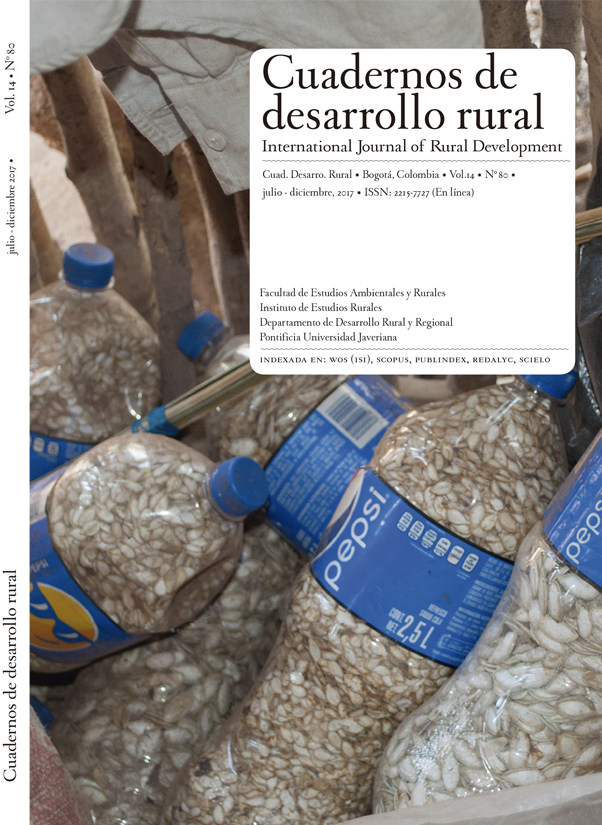Abstract
Following the parameters postulated in the decent work agenda of the International Labor Organization (ILO), this research study explores the working conditions of agriculture as the main determinants of rural migration in three regions of northern Ecuador. For this purpose, we assume the approaches of family farming and rural youth. We demonstrate through qualitative and quantitative methods that the absence of
decent work increases the propensity of farmers to migrate and participate in new economic activities, such as the making of handicrafts and the sale of labor outside the farm. Meanwhile, rural youth consider that precarious working conditions, low economic income, and labor exploitation in agriculture, as well as the lack of adequate and dignified rural employment, are the main causes for migration and the abandonment of agriculture.
Bernstein, H. (2012). Dinámicas de clase y transformación agraria. Zacatecas, México: Universidad Autónoma de Zacatecas, Miguel Ángel Porrúa.
Bilsborrow, B. (2002). Migration, population change, and the rural environment. Environment Change and Security Program, 14(9), 69-94.
Brassel, F., Ruiz, P., y Zapata, A. (2008). La estructura agraria en el Ecuador: una aproximación a su problemática y tendencias. En F. Brassel, S. Herrera, y M. Laforge. (Eds),¿Reforma agraria en el Ecuador?: viejos temas, nuevos argumentos(pp.17-30). Quito, Ecuador: Sistema de Investigación de la Problemática Agraria en el Ecuador (SIIPAE).
FAO. (2012). Decent rural employment for food security: a case for action. Rural employment. Roma, Italia: FAO.
FAO. (2014a). Turning family farm activity into decent work. Roma, Italia: FAO.
FAO. (2014b). Private and public partnership model for youth employment in agriculture Experiences from Malawi, Tanzania Mainland and Zanzibar archipelago. Rural employment case study series, (4). Roma, Italia: FAO.
FAO.(2016). The estate of food and agriculture. Climate change, agriculture and food security. Roma, Italia: FAO.
Filmer, D., y Fox, L. (2014). Youth employment in sub-Saharan Africa: Agricultural career paths for the future. AfricaDevelopment Series. Washington, DC, Estados Unidos: The World Bank.
Galvez, S., Gutierrez, E., Picazzo, E., y Osorio, J. (2016). El trabajo decente, una alternativa para reducir la desigualdad en la globalización: el caso de México. Región y Sociedad, 28(66), 56-94.
Ghai, D. (2003). Decent work: Concept and indicators. International Labour Review, 142(2), 113-146.
Gray, C. (Febrero, 2009). Environment, Land, and Rural Out-migration in the Southern Ecuadorian Andes. World Development, 37(2), 457-468.
Hertel, S. (2009), Human Rights and the Global Economy: Bringing Labor Rights Back In. Maryland Journal of International Law, 24(1), 240-252.
IESS. (s.f.). Seguro Campesino. Recuperado de https://www.iess.gob.ec/es/19
Jokisch, D. (Diciembre, 2002). Migration and Agricultural Change: The Case of Smallholder Agriculture in Highland Ecuador. Human Ecology, 30(4), 523- 550.
Kaenzig, R., y Piguet, E. (2016). Migration and climate change in Latin America and the Caribbean. En E. Piguet, y F. Laczko. (Eds.),People on the Move in a Changing Climate(pp.155-176). Ginebra, Suiza: Springer.
Kucera, D. (2001). The effects of core worker rights on labour costs and foreign direct investment: Evaluating the “conventional wisdom”. Ginebra, Suiza: International Institute of Labour Studies.
Ley Orgánica del Régimen de la Soberanía Alimentaria (LORSA). Registro OficialSuplemento 583 de la República de Ecuador, Quito, Ecuador, 28 de abril de 2009.
OIT. (Mayo, 2006). Decent work in the Americas: An agenda for the Hemisphere, 2006-2015, 2006–2015. Brasilia, Brasil: OIT.
OIT. (2012).Working towards sustainable development: opportunities for decent work and Social Inclusion in a Green Economy. Ginebra, Suiza: OIT,
OIT. (2016). Global estimates of modern slavery: forced labour and forced marriage. Ginebra, Suiza: OIT.
OIT. (2017). Global estimates of child labour: Results and trends, 2012-2016. Ginebra, Suiza: OIT.
ONU.(Septiembre, 2013). The number of international migrants worldwide reaches 232 million. Population Facts, (2). Recuperado de https://esa.un.org/unmigration/documents/the_number_of_international_mig rants.pdf
ONU. (Junio, 2016).Progress towards the Sustainable Development Goals. Recuperado de https://unstats.un.org/sdgs/files/report/2016/secretary- general-sdg-report-2016--EN.pdf
PMA. (s.f.). Supporting local government capacities to improve food and nutrition security in Ecuador. Quito, Ecuador: WFP.
Pyke, F. (2014). Promoting cluster development through decent work: the case of the Surat diamond Processing Cluster. En K. Das. (Ed.), Globalization and Satandars.India Studies in Business and Economics Globalization and Standards(pp.209-223). Nueva Delhi, India: Springer.
SENPLADES. (2013). Plan Nacional para el Buen Vivir 2013-2017. Quito, Ecuador: Secretaría Nacional de Planificación y Desarrollo, SENPLADES.
Taylor, J. (1999). The new economics of labour migration and the role of remittances in the migration process. International Migration, 37(1), 63-88.
Viteri, J. (2010). Trabajo decente: Diagnóstico nacional del Ecuador. Quito, Ecuador: Plades.
Wiggins, S. (2016). Agricultural and rural development reconsidered. IFAD Research Series, (1). Roma, Italia: IFAD.
Zubero, I. (2007). Trabajo decente: iluminando una realidad cada vez más oscura. En J. Stiglitz, S. Amartya, y I. Zubero. (Eds.), Se busca trabajo decente (pp.7-84).Cataluña, España: Ediciones HOAC.
Cuadernos de Desarrollo Ruralis registered under a Creative Commons Attribution 4.0 International Public License. Thus, this work may be reproduced, distributed, and publicly shared in digital format, as long as the names of the authors and Pontificia Universidad Javeriana are acknowledged. Others are allowed to quote, adapt, transform, auto-archive, republish, and create based on this material, for any purpose (even commercial ones), provided the authorship is duly acknowledged, a link to the original work is provided, and it is specified if changes have been made. Pontificia Universidad Javeriana does not hold the rights of published works and the authors are solely responsible for the contents of their works; they keep the moral, intellectual, privacy, and publicity rights.
Approving the intervention of the work (review, copy-editing, translation, layout) and the following outreach, are granted through an use license and not through an assignment of rights. This means the journal and Pontificia Universidad Javeriana cannot be held responsible for any ethical malpractice by the authors. As a consequence of the protection granted by the use license, the journal is not required to publish recantations or modify information already published, unless the errata stems from the editorial management process. Publishing contents in this journal does not generate royalties for contributors.



